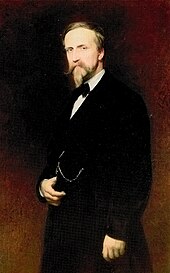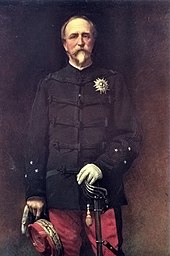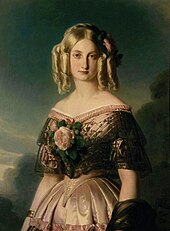Henri d'Orléans, duc d'Aumale
Henri-Eugène-Philippe-Emmanuel d'Orléans, duc d'Aumale (born January 16, 1822 in Paris , † May 7, 1897 in Zucco near Palermo ) was a French general, historian and art collector.
Life
The Duke of Aumale was the fourth son of the Duke of Orléans and later Citizen King Louis-Philippe and Maria Amalia of Naples-Sicily . After training at the Collège Henri IV , he joined the army at the age of 17 and became a captain in 1839 . In 1840 he accompanied his brother, the Duke of Orléans , as an orderly officer to Algeria , where he took part in several campaigns and was quickly promoted to lieutenant colonel .
Because of an illness he returned to France in July 1841 . On September 3, while he was at the head of his regiment, he almost became the victim of an assassination attempt by the extremist François Quenisset. In 1842 he was awarded the Grand Cross of the Legion of Honor . Promoted to Général de division in October of the same year , he returned to Algeria, where he commanded the Medea subdivision until 1843. One of his greatest achievements was the removal of the Smala Abd el-Kaders on May 16, 1843. For this he was appointed Lieutenant-General and Commander-in-Chief of the Constantine Province. In 1844 he led the expedition to Biskra . On September 27, 1847 he was appointed Governor General of Algeria in place of Thomas Robert Bugeaud de la Piconneries and became very popular with the colonists and the army. He was generally considered to be the most gifted of the sons of Louis-Philippe and, since the death of the Duke of Orléans, his eldest brother, also the most popular.
After the outbreak of the February Revolution in 1848 he handed over his office to General Cavaignac and, after saying goodbye to the army with a speech, went into exile in England, where he settled in Claremont , Sussex , and Twickenham near London .
After the outbreak of the Franco-German War, Aumale first offered his services to the imperial and then to the provisional government, but was refused by both. On February 8, 1871, he was elected to the National Assembly for the Oise department after he had spoken out in favor of the constitutional monarchy as the best form of government, but had declared that he would also submit to the republic. His election - like that of his brother François d'Orléans - was declared valid, and contrary to a promise made to Adolphe Thiers , Aumale took his seat in the assembly in December 1871 in which he joined the right-wing center. But he took only a small part in political affairs. In the same year Aumale was accepted into the Académie française as the successor to Count Montalembert .
After chairing the court-martial over Bazaine in 1873, showing great chauvinistic zeal, he was appointed commander of the 7th Corps in Besançon . But the radical republic's definitive victory thwarted his ambitious plan to become president of a conservative republic. In February 1879 he was appointed inspector general of the army, but in 1883 - like all possible pretenders to the throne - he was also removed from this military position.
In 1886 another law was passed that expelled the heads of all previously ruling families from France and provided that in future the members of these families would no longer hold any public office and could no longer be elected to public bodies. Aumale protested vigorously but was also expelled. Nevertheless, in his will of June 3, 1884, he bequeathed his Chantilly Castle, including the extensive art collection kept there, to the Institut de France . This generosity led the government to repeal the exile and the duke was able to return to France in 1889. The art collection can be seen today in the Musée Condé in Chantilly . In December 1895 he was elected an honorary member of the Russian Academy of Sciences in Saint Petersburg .
Aumale mostly lived in his magnificent Chantilly castle near Paris. Through the inheritance of the last Condé , he acquired an enormous fortune, which was considerably increased through thrift and the return of Orléans goods.
family
On November 25, 1844, the Duke of Aumale married his cousin, the daughter of Prince Leopold of Salerno, Maria Karolina Augusta of Naples-Sicily . Of his two sons Louis Philippe d'Orléans, prince de Condé , born on November 15, 1845 in Saint-Cloud , and François Louis d'Orléans, duc de Guise, born on January 5, 1854 in Twickenham, the first died on November 24, 1854 May 1866 from typhus on a trip to Australia in Sydney , the younger on July 25, 1872 in Paris.
Works
In exile in London, the Duke of Aumale wrote a number of articles on war science and history that appeared in the Revue des Deux Mondes and made him famous in literature. As a result of a speech given by Prince Napoléon in the Senate, which was highly offensive to the Orléans, Aumale published a pamphlet in April 1861: Lettre sur l'histoire de France , in which he spoke to the Prince and Napoleon III. heavily criticized. This pamphlet caused a tremendous stir in France and resulted in severe penalties for the printer and publisher. Aumales Histoire des Princes de Condé, pendant les XVI. au XVII. siécles (Paris 1869, 2 volumes) could only be published after many obstacles and a long process. In the Brussels journal Etoile Belge in 1865/66 under the name "Verax" he published a series of critical letters on the politics of the Empire and in 1867 his famous work Les institutions militaires de la France (Brussels, 1867). Aumale was also believed to be the author of the pamphlet Qu'a-t-on fait de la France (early 1868), which was banned in France .
- The Orleans against the Napoleonids: Letter on the History of France . - Berlin: Winkler, 1861. Digitized edition of the University and State Library Düsseldorf
literature
- The Duke of Aumale in Algeria . In: Illustrirte Zeitung . No. 30 . J. J. Weber, Leipzig January 20, 1844, p. 52-54 ( books.google.de ).
- Raymond Cazelles : Le duc d'Aumale: Prince au dix visages . Jules Tallandier, Paris 2004, ISBN 2-235-01603-0 .
- Léonce Grandin: Le duc d'Aumale: Le Prince, le soldat, l'historien. Avec introduction to Son Eminence le Cardinal Perraud . René Haton, Paris 1897.
- Eric Woerth: Le duc d'Aumale. L'étonnant destin d'un prince collectionneur . L'Archipel, Paris 2006, ISBN 2-84187-839-2 .
Web links
- Short biography and list of works of the Académie française (French)
- chateaudechantilly.com (French; English)
Individual evidence
- ^ Foreign members of the Russian Academy of Sciences since 1724: d'Aumale, Henri-Eugène-Philippe-Louis, Duke of Orleans. Russian Academy of Sciences, accessed November 29, 2019 (Russian).
| personal data | |
|---|---|
| SURNAME | Aumale, Henri d'Orléans, duc d ' |
| ALTERNATIVE NAMES | Aumale, Henri-Eugène-Philippe-Emmanuel d'Orléans duc d ' |
| BRIEF DESCRIPTION | French general, historian and art collector, member of the National Assembly |
| DATE OF BIRTH | January 16, 1822 |
| PLACE OF BIRTH | Paris |
| DATE OF DEATH | May 7, 1897 |
| Place of death | Zucco (Sicily) |




